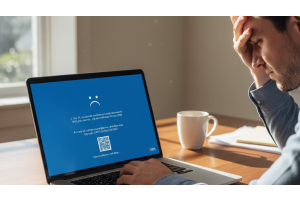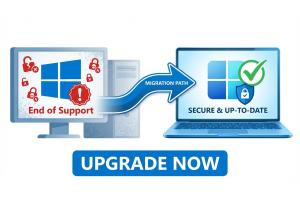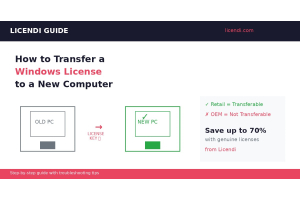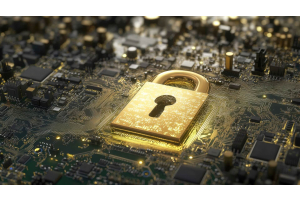Is it legal to buy second-hand software?
Introduction
The purchase of second-hand software has become an increasingly common practice in the European digital market. This concept refers to the acquisition of software licenses that have already been used by a previous owner but are still valid for a new user. Its rise is due to the fact that it offers the opportunity to obtain cheap and legal software: users can get original programs at a reduced price without engaging in illicit practices. In recent years, both individuals and companies in Europe have shown increased interest in these used licenses due to their economic and sustainable advantages.
Despite its growing popularity, many users ask themselves: is it legal to buy second-hand software? For years, there were doubts in this regard, especially in the case of software acquired through digital download. However, European Union legislation has clarified this scenario. The answer in the EU is affirmative: the buying and selling of used software licenses is legal, as long as certain conditions are met that protect the rights of the original developer and the consumer. Below, we will explore the European legal framework that supports this practice, the differences between physical and digital software, the consumer rights involved, and the precautions buyers should take to ensure a legal and safe purchase.
Legal framework in the EU for second-hand software
The European Union has a legal framework that supports the buying and selling of used software licenses. The cornerstone of this framework is the principle of exhaustion of the distribution right, enshrined in European software legislation. Essentially, this principle establishes that after the first legitimate sale of a program within EU territory, the original rights holder (for example, the developer) cannot oppose the resale of that copy.
This criterion was firmly confirmed by the Court of Justice of the EU (CJEU) in a landmark ruling from 2012 (case UsedSoft vs. Oracle). In that ruling, the CJEU declared that the trade of second-hand software is lawful under EU law, even when it involves programs acquired through digital download and not on physical media. The Court clarified that if a software manufacturer has received adequate remuneration for the initial sale of a perpetual license, their exclusive distribution rights over that copy are considered exhausted. Therefore, the subsequent buyer obtains the right to use that software permanently, just as if they had purchased the product new, as long as the original owner ceases to use it (by uninstalling or deactivating their copy).
This CJEU jurisprudence is binding in all Member States. In practice, it means that in Spain and the rest of the EU countries, buying second-hand software is legal as long as the legal conditions established for it are respected. Authorization from the original manufacturer is no longer required for the resale of the license, since their distribution rights are extinguished after the first sale.


Differences between physical and digital software
Traditionally, the idea of second-hand software was associated with physical products, such as CDs or DVDs accompanied by their license key. In those cases, reselling meant handing over the original medium to the buyer and ensuring that no installed copies were retained. In contrast, in the digital era, most programs are acquired through digital licenses (keys or online downloads), which raises the question of whether they can be resold in the same way.
EU legislation has made it clear that there is no legal distinction between software purchased in a box and software obtained through digital download, as long as the granted license is perpetual. This means that if a user bought a program online with a permanent license, they have the same right to sell that license as if they had a physical disc. The transfer in the digital realm consists of providing the new buyer with the product key or necessary credentials, and the original seller must completely delete the software from their devices. The end result is equivalent: the new acquirer becomes the sole legitimate user of that copy, protected by law.
Consumer rights when buying second-hand software
When buying second-hand software, European consumers retain a series of rights that ensure a safe purchasing experience. First, there is the right to information: the seller must provide clear details about the license, its origin, and conditions (for example, the version of the program, the type of license, and whether it is valid for perpetual use). There is also the right to a compliant product, meaning that the acquired license must function as described. If the software or activation key presents issues or is not legitimate, the buyer is entitled to solutions (such as a key replacement or a refund), backed by consumer protection laws.
Another aspect is the right of withdrawal for remote purchases. In the European Union, consumers typically have 14 days to revoke an online purchase. However, in the case of digital content such as software licenses, this right may no longer apply once the key has been delivered and activated. If the buyer gives their explicit consent to immediately receive the digital license (and acknowledges that this waives their right of withdrawal), the seller can provide the software key instantly. After activation, the purchase cannot be canceled unless there has been a breach by the seller. That’s why it is important to be sure before redeeming or installing a used digital license. Nevertheless, trustworthy sellers often offer an activation guarantee, ensuring that the license works correctly or the customer receives a refund otherwise.
How to legally buy second-hand software: key aspects
To ensure that the purchase of a used license is legitimate, the buyer should verify certain key points:
- Genuine original license: The offered license must originate from an initial sale authorized by the rights holder within the European Union. This ensures that the product entered the market legally.
- Inactive license: The previous owner must have stopped using the software. It is essential that the license is released (uninstalled or unlinked from previous devices), so that the buyer becomes the only valid user.
- License integrity: The license must be transferred in full, not split. For example, if it was part of a bundle or volume, the portion sold must correspond to a valid and independent license. It is not allowed to “duplicate” or sell more activations than were originally acquired.
- Documentation and transparency: The seller should provide some proof of the license’s legitimacy (original invoice, certificate, or at least a written guarantee). A serious provider will clearly state that the sale complies with EU legislation and will be willing to clarify any legal doubts.
How to identify legal and trustworthy vendors
Once the legal conditions are understood, the next step is to choose a trusted seller. To buy with peace of mind, it is important to verify that the provider is an established and transparent company. Ideally, it should be located in Europe and subject to EU regulations. Look for signs of reliability: a professional website with clear legal information, visible warranty policies, and customer support or contact channels. Reviews from other buyers and the company’s track record in the market (years of activity, references, etc.) also help confirm its trustworthiness.
A legitimate provider of legal digital licenses will have no issue explaining the origin and legality of its products. For example, the European store Licendi is a benchmark in the sale of legal second-hand software. This provider complies with EU regulations and offers original licenses with activation guarantees, ensuring that each key works correctly. In addition, this company provides its customers with a section of legal information about its products where the legal basis of its service is detailed and frequently asked questions are answered. This demonstrates a strong commitment to transparency. Choosing a trusted seller like Licendi allows buyers to benefit from reduced prices without compromising safety or legality.


Economic and Sustainable Benefits of Second-Hand Software
The most evident benefit of choosing second-hand software is cost savings. Used licenses are typically sold at a fraction of the cost of a new license. Buyers can obtain original software from the same manufacturers (Microsoft, Adobe, etc.) with discounts that in many cases reach 50% or more off the official price. This translates into access to professional software at a reduced price, without sacrificing legality. For many small and medium-sized businesses, the ability to equip their computers with affordable and legal software is a major advantage, as it frees up resources for other business areas.
Beyond the economic aspect, there is a clear sustainability benefit in reusing licenses. By reselling and repurposing existing software, a more responsible consumption aligned with the circular economy is promoted. In the case of software distributed on physical media, reselling prevents boxes, discs, and manuals from being discarded, reducing electronic and packaging waste. Even when it comes to digital licenses, making use of an already issued license instead of acquiring a new one helps optimize the resources invested in the development and distribution of the software. In short, this practice offers a double benefit: it saves money and helps the planet at the same time.
Furthermore, acquiring second-hand software significantly contributes to reducing the carbon footprint associated with the manufacturing and distribution of new products. Each reused license prevents the emission of pollutants resulting from industrial processes, transportation, and logistics tied to the production of new licenses. This reduction in environmental impact is not only a responsible act towards the planet but also improves corporate image, attracting customers who value sustainability. Additionally, opting for used licenses helps maintain the economic value of software, creating a dynamic secondary market that can benefit both sellers and buyers. Companies that regularly upgrade their software can recover part of their initial investment by reselling their licenses, while those acquiring used licenses gain access to advanced technological tools without straining their budget. Ultimately, choosing second-hand software not only offers economic and environmental advantages but also fosters a more conscious and responsible business culture.
Conclusion
The buying and selling of second-hand software, when done correctly, proves to be a fully legal option with many advantages. Thanks to the support of EU legislation and the existence of reliable European vendors, users can legally purchase used software and enjoy original programs at a lower cost. By following the recommendations for verifying licenses and choosing reputable sellers, it is possible to take advantage of this alternative with total confidence. In today’s digital era, second-hand software presents itself as a smart solution that combines economic savings, legality, and sustainability.
Moreover, choosing legal second-hand digital licenses is a strategic decision that can greatly facilitate access to professional software for small businesses, freelancers, and individual users with limited budgets. This allows financial resources to be allocated to other important areas, such as business growth or education. On the other hand, this approach encourages fairer and more balanced competition in the European tech market, where both large and small businesses can equally access advanced digital tools. Likewise, by choosing certified and transparent vendors, consumers can be confident they are contributing positively to a circular economy that aims to minimize the environmental impact associated with the continuous production of new digital goods. For all these reasons, second-hand software is a safe, responsible, and forward-looking choice.




